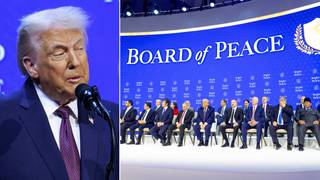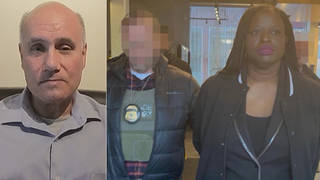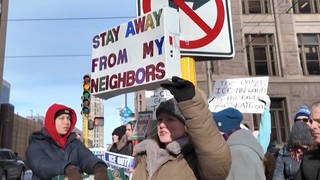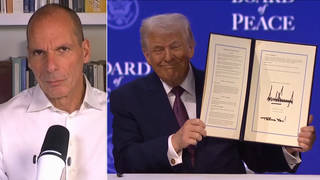
Palestinians in Gaza are fleeing Khan Younis after the Israeli military issued expulsion orders for the besieged territory’s second-largest city. This comes as Israel’s bombardment of Gaza intensifies, killing hundreds of Palestinians over the weekend, including at least five journalists. Health facilities have been under constant attack. Israel on Sunday announced the start of a renewed ground invasion it calls Operation Gideon’s Chariots. Prime Minister Benjamin Netanyahu also said Sunday that Israel would allow limited food supplies into Gaza as the population of more than 2 million faces famine after 11 weeks of a total Israeli blockade, but there are few details about when such aid shipments could arrive. Gaza’s Health Ministry confirms Israel has killed at least 53,300 Palestinians in Gaza since October 2023, a death toll believed to be a vast undercount.
“The situation, as anyone who’s following the news can see, is thoroughly apocalyptic,” says Middle East analyst Mouin Rabbani. “There is not only an unprecedented siege, but also an unprecedented intensification of Israel’s genocidal military campaign in the Gaza Strip.” Rabbani also stresses that any progress on aid, lifting the siege or reaching a ceasefire is dependent on the Trump administration using its leverage over Israel. “It will take no more than a phone call from Washington,” he says.
Transcript
AMY GOODMAN: We begin today’s who in Gaza. Palestinians are fleeing Khan Younis, the besieged territory’s second-largest city, after the Israeli military issued expulsion orders. This comes as Israel’s bombardment of Gaza intensifies, killing hundreds of Palestinians over the weekend, including at least five journalists. Health facilities have been under constant attack.
On Sunday, Israel announced “Operation Gideon’s Chariots,” what it called a new “extensive ground operation” in Gaza. The prominent Israeli columnist Gideon Levy said a more apt name for the offensive would be, quote, “Chariots of Genocide,” unquote.
The prime minister of Israel, Benjamin Netanyahu, said Sunday Israel would allow limited food supplies into Gaza as the population of more than 2 million faces famine after 11 weeks of a total Israeli blockade. But it’s not clear exactly when that food will cross the border.
U.N. Secretary-General António Guterres once again decried the catastrophic situation in Gaza and the utter failure of the international community to stop Israel.
SECRETARY-GENERAL ANTÓNIO GUTERRES: In Gaza, the situation of Palestinians is beyond description, beyond atrocious and beyond inhumane. The policy of siege and starvation makes a mockery of international law.
AMY GOODMAN: NBC News reports the Trump administration is working on a plan to permanently remove 1 million Palestinians from Gaza and transfer them to Libya. On Friday, U.N. human rights chief Volker Türk said Israel’s actions in Gaza are, quote, “tantamount to ethnic cleansing.”
Gaza’s Health Ministry confirms Israel has killed at least 53,300 Palestinians in Gaza since October 2023. The death toll does not account for thousands of people believed dead, including those trapped under the rubble, nor those killed by the indirect effects of Israel’s assault on Gaza. In fact, the number could be more than two times, three times higher.
For more, we’re joined in Montreal by Mouin Rabbani, Middle East analyst, co-editor of Jadaliyya and a nonresident fellow at the Center for Conflict and Humanitarian Studies. He’s a contributor to the book Deluge: Gaza and Israel from Crisis to Cataclysm.
Welcome back to Democracy Now!, Mouin. Thanks so much for being with us.
MOUIN RABBANI: It’s good to be with you.
AMY GOODMAN: If you can respond to the situation right now, the escalation of the attacks on Gaza?
MOUIN RABBANI: Well, the situation, as anyone who’s following the news can see, is thoroughly apocalyptic. There is not only an unprecedented siege, but also an unprecedented intensification of Israel’s genocidal military campaign in the Gaza Strip. And judging by the statements of Israel’s most senior leaders, it aims towards the complete occupation of the Gaza Strip and the destruction of everything that remains standing in the Gaza Strip, and ultimately the mass, full forcible expulsion of its entire population.
And the past few days have been particularly cataclysmic, at the same time negotiations about a potential new agreement are ongoing. And this will be decided neither by Israel nor by the Palestinians, but by the United States. To the extent that Israel continues with this assault, it means that it has a U.S. green light for doing so. To the extent that the situation changes, that means that Israel has been instructed by Washington to change course.
AMY GOODMAN: Talk about Israel partially lifting the blockade. What exactly does this mean, after 11 months of a full blockade on medicine and aid — 11 weeks?
MOUIN RABBANI: At this stage, it doesn’t appear to mean very much. According to reports available this morning, Israel is preparing to permit something on the order of 50 trucks to enter the Gaza Strip. And we’re talking about a population of between 1.5 and 2 million people who have been deprived of any goods entering from outside the territory since the very beginning of March. So, this is clearly a drop in the bucket.
I think the more important question is whether this is the beginning of a lifting of the siege under U.S. and international pressure, and, just as importantly, whether Israel and the U.S. are going to move ahead with this harebrained scheme, that has already been denounced by the international aid community, of setting up a aid mechanism whose purpose is to force the relocation of the Gaza Strip population to specified locations where they can access limited humanitarian supplies under the watchful eye of U.S. mercenaries acting on behalf of the Israeli military and government.
AMY GOODMAN: Can you talk about the U.S. plan that’s been reported to move Palestinians to Libya?
MOUIN RABBANI: Yes, and it’s interesting that this report has now been formally denied by the U.S. Embassy in Libya, I think as a precautionary measure, given what happened to that embassy about a decade ago. But we do know that President Trump has repeatedly proposed an initiative whereby the entire Palestinian population of the Gaza Strip would be forcibly relocated outside the Gaza Strip. It would be taken over and rebuilt, presumably by U.S. real estate developers acting in coordination with Israel. And there have been persistent reports that the U.S. and Israel have been approaching a variety of countries, both within the region and beyond, to accept these forcibly displaced Palestinians.
And in respect of Libya, the reports are that the U.S. has offered Libya to unfreeze billions of dollars in Libyan funds that have been frozen in international financial institutions since the reign of Muammar Gaddafi, who was overthrown and killed over a decade ago, if and only if Libya accepts 1 million Palestinians on its territory. This would increase the Libyan population by over 10%. And it’s effectively bribing Libya with its own money to participate in this war crime and crime against humanity. But it seems to me exceptionally unlikely that Libya will even seriously consider this proposal for one moment, given the impact it would have on Libya’s domestic politics, which is very strongly pro-Palestinian. And I think the real issue here is not the extent to which this initiative can actually be implemented, but rather the legitimization it gives to Israel’s determination, repeatedly expressed, to expel the Palestinian population of the Gaza Strip, and, further down the line, from the West Bank, as well.
AMY GOODMAN: On Friday, President Trump actually said, quote, “A lot of people are starving” in Gaza under the Israeli blockade. He said the U.S. wanted to help reduce the suffering. What can the U.S. do? What can the world do? You have up to 100,000 people in the Netherlands protesting outside The Hague. You have a number of Italian Parliament members going to the Egyptian side of the Rafah border demanding that the world stop arming Israel. Can you talk about what the solutions are at this point?
MOUIN RABBANI: Well, you had, as you mentioned, the 100,000, approximately, protesters in the Netherlands, with reports of something in the range of half a million in London the day before. And there is growing opposition and disgust with Israel’s engineered starvation policy and absolutely genocidal military campaign in the Gaza Strip. And a number of European governments are now beginning to speak more loudly, as well, calling, for example, for reconsideration of Israel’s preferential trade privileges with the European Union.
But at this stage, the decision really will be made not in London or Brussels or Berlin, but in Washington, because of the extraordinary leverage that the United States exercises over Israel. And it will take no more than a phone call from Washington to the Israeli government to effect a complete reversal in Israeli policy within the space of a day. That’s really the only reason we’re now seeing this limited — very limited — resumption of aid.
And with respect to the statements by President Trump, I think we also need to bear in mind we’re dealing here with a quite erratic leader who can contradict himself in the space of a day or even an hour. So, what we really need to focus is not so much on what he says, but what the United States does. There are ongoing negotiations for a new agreement. And it’s difficult to tell exactly what’s happening there. Of course, they’re being held behind closed doors. But we still need to find out the extent to which Washington is exercising genuine pressure, if any, on Israel to force it to accept an agreement that will lift the siege, lead to an exchange of captives, and ultimately put an end to this genocidal war.
AMY GOODMAN: Let me ask you, finally — Drop Site News is reporting a senior Hamas official received assurances from President Trump’s special envoy, Steve Witkoff, the U.S. would force Israel to lift the Gaza blockade within two days after releasing the U.S.-Israeli citizen Edan Alexander. Basem Naim, a member of Hamas’s political bureau, said the Trump administration reneged on its promise, saying, “They didn’t violate the deal. They threw it in the trash.” Your response to the report? And do you think that’s why they lifted — Israel lifted it partially?
MOUIN RABBANI: Well, these reports may well form part of the background of today’s developments that we’ve been discussing. But at the time, it was — you know, Hamas said it was releasing this Israeli soldier, who’s also a U.S. citizen, as a goodwill gesture on the eve of Trump’s visit to the Middle East, and the Americans also said they had offered nothing in exchange. So, quite clearly, there were no formal undertakings by the United States, but I think it’s entirely reasonable to suppose that there were informal assurances given. And those, once again, ended up not being worth the paper they were or, in this case, were not written on. But at the same time, they could form part of the background of the developments that we’re seeing now, which is that negotiations seem to have been intensified. I think it’s very premature to conclude that they will succeed or result in a meaningful agreement, but there’s quite clearly more going on behind the scenes than we are directly aware of.
AMY GOODMAN: Mouin Rabbani, I want to thank you for being with us, Middle East analyst, co-editor of Jadaliyya and a nonresident fellow at the Center for Conflict and Humanitarian Studies, a contributor —
MOUIN RABBANI: Thank you for having me.
AMY GOODMAN: — to the book Deluge, speaking to us from Montreal, Canada.
When we come back, “The Group Behind Project 2025 Has a Plan to Crush the Pro-Palestinian Movement.” We’ll speak with New York Times investigative reporter Katie J.M. Baker about the Heritage Foundation’s Project Esther. Stay with us.
[break]
AMY GOODMAN: Emel Mathlouthi, the Tunisian singer, performing last night at the People’s Graduation for Columbia Students in honor of the Palestinian activist Mahmoud Khalil, who was supposed to graduate from Columbia’s SIPA school, the School of International and Public Affairs. Instead, he’s imprisoned in an immigration jail in Louisiana.











Media Options